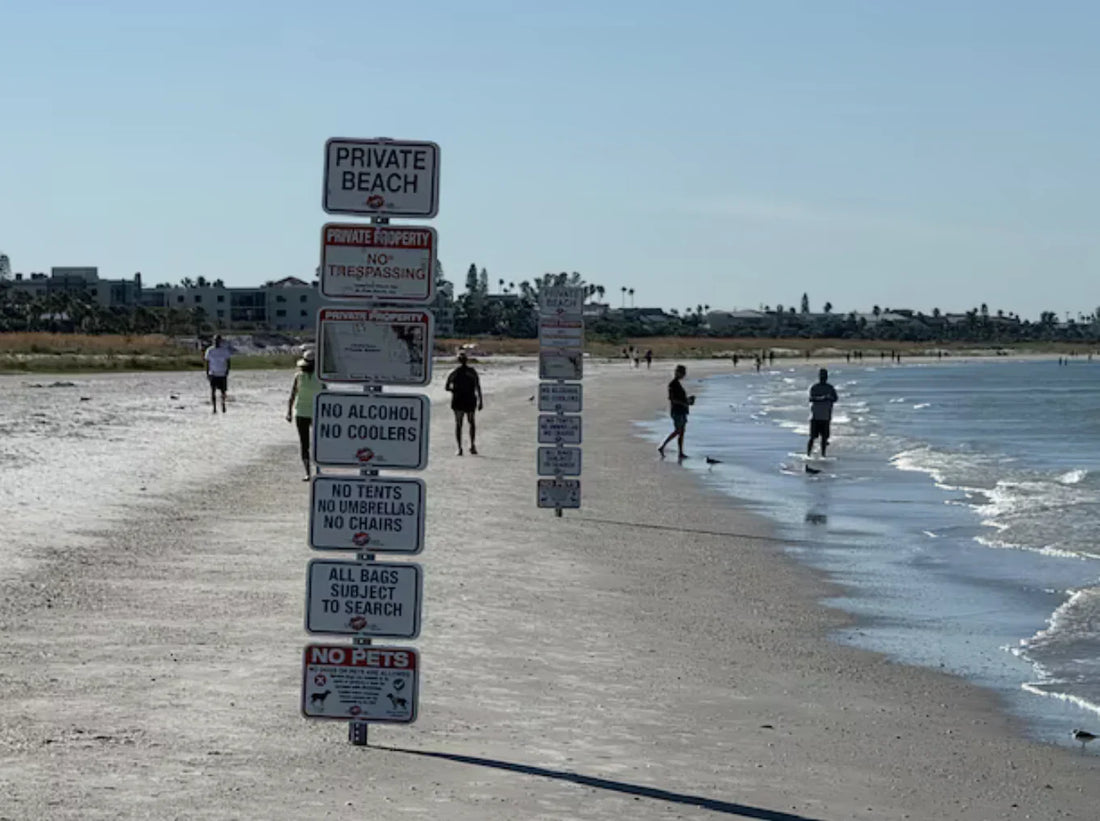
Sun, Sand, and Greed: The Undertow’s War on Public Beaches
Share
Locals Push Back as The Undertow Claims a Slice of St. Pete Beach
It was a calm evening on St. Pete Beach until the signs went up at the water’s edge. “PRIVATE BEACH,” they warned, stamped with The Undertow Beach Bar name and its well-known lips logo. By sunrise, the chatter had already taken over neighborhood pages and local groups like a wave rolling in. Residents, tourists, and longtime beachgoers were all asking the same thing: who actually owns the sand beneath their feet?
A New Line in the Sand
A short walk south of the 4700 Gulf Boulevard parking lot now leads to two new Undertow signs planted just feet from the surf, so close that the waves nearly touch them at high tide. The bar’s claim stretches across roughly a football field of shoreline, asserting that The Undertow has the right to ban coolers, tents, umbrellas, and chairs, and even search the bags of beachgoers. To many, the message was clear: what was once community coastline was being rebranded as a private front yard.
City Hall Catches the Wave

St. Pete Beach city officials quickly took notice. Interim city attorney Ralf Brookes confirmed that the city is reviewing whether those signs have any legal standing and may move to have them taken down.
Under Florida law, the area seaward of the mean high-water line is public property, guaranteed by the state constitution. The dry sand above it can, in some cases, be privately owned but access to the wet sand is not negotiable. Brookes emphasized that a survey would be required to pinpoint the line exactly, but beach access itself remains protected for everyone.
The Undertow Digs In
The Undertow’s attorney claims the bar followed proper procedure, commissioning a survey approved by the Florida Department of Environmental Protection to mark the correct boundary. They argue that the mean high-water line doesn’t always match where the “wet sand” appears, since tides, erosion, and weather constantly reshape the shoreline.
Still, locals aren’t buying it. To many, the legal justification feels like a convenient technicality. One that swaps community spirit for corporate territory. The beach, they argue, isn’t a property line to be measured; it’s a public treasure that’s supposed to stay open for everyone.
Locals Fire Back
If The Undertow hoped to stake its claim quietly, that plan sank fast. Within hours, social media was filled with outrage and boycott talk. Longtime patrons expressed disappointment, while residents called the move “tone-deaf” and “greedy.” Even tourists joined the backlash after seeing employees hammer the signs into the sand.
“I’m appalled because this is a beach,” one visitor said after watching it unfold. “God created these things for us to use.” Her words echoed through community comment threads across the coast: you can rent a cabana, but you can’t own the coast.
Whose Beach Is It, Really?

This dispute is about more than a few signs. It’s a test of what kind of city St. Pete Beach wants to be: a place that protects public access and coastal charm, or one that lets private businesses carve up paradise in the name of profit. For generations, Florida has built its identity around open beaches, shared spaces, and sunsets that belong to everyone.
Moves like this risk rewriting that story. If The Undertow’s claim holds, what’s to stop other bars or resorts from drawing their own borders, one tide at a time?
Where St. Pete Draws the Line
The Undertow may serve a strong drink and a decent view, but this latest stunt feels like claiming more than just beachfront. It’s about ownership of space, of access, and of the local identity that defines this coast. The city’s decision in the coming weeks won’t just settle a legal question; it’ll reveal how much St. Pete is willing to protect its shoreline from privatization dressed up as policy.
Would you still grab a drink at a bar that claims the sand as its own? Drop your thoughts below, this debate might just decide the future of our beaches.

